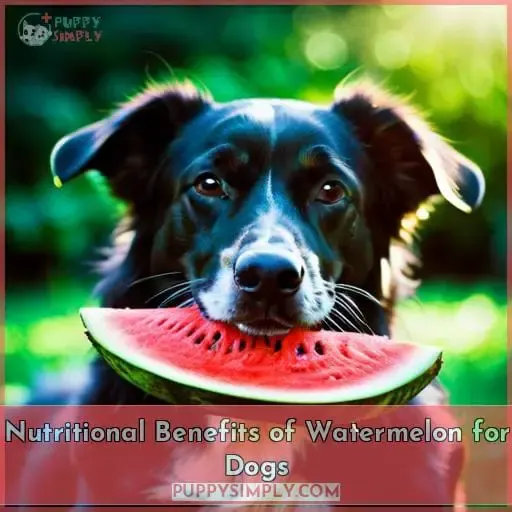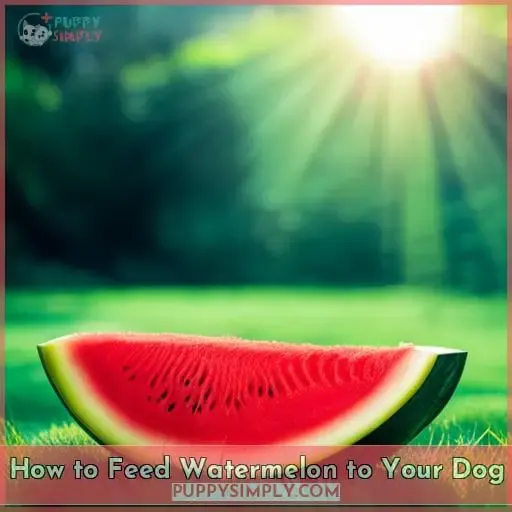This site is supported by our readers. We may earn a commission, at no cost to you, if you purchase through links.
 When you cut into this juicy melon, your pup’s nose may start twitching, begging for a taste.
When you cut into this juicy melon, your pup’s nose may start twitching, begging for a taste.
The good news is watermelon’s safe for dogs. Just be sure to remove the rind and seeds first since they can cause stomach upset.
This sweet treat’s packed with vitamins and minerals.
But limit portions, as too much sugar can lead to diarrhea or weight gain.
Given in moderation, watermelon’s a nutritious snack dogs love on hot summer days.
Table Of Contents
- Key Takeaways
- Is Watermelon Safe for Dogs?
- Nutritional Benefits of Watermelon for Dogs
- Potential Risks of Watermelon for Dogs
- How to Feed Watermelon to Your Dog
- How Much Watermelon Can Dogs Eat?
- Watermelon Alternatives for Dogs
- Other Fruits Dogs Can Eat
- Fruits Toxic to Dogs
- When to Seek Veterinary Advice
- Frequently Asked Questions (FAQs)
- Conclusion
Key Takeaways
- Remove seeds and rind before serving to dogs to prevent intestinal obstruction or choking
- Feed watermelon in moderation as an occasional treat to avoid stomach upset and weight gain
- Watermelon can provide nutritional benefits to dogs like vitamins, minerals and antioxidants
- Consult your vet if your dog has allergies or medical conditions before feeding watermelon
Is Watermelon Safe for Dogs?
You can safely feed your dog watermelon in moderation.
Watermelon offers hydration and nutrients, but too much can cause gastrointestinal upset.
Look for seedless options to avoid potential intestinal blockage.
Frozen watermelon makes a tasty treat in summer.
Still, consult your veterinarian, as some dogs have watermelon allergies.
With guidance, you can incorporate small amounts of this sweet, low-calorie fruit into a balanced canine diet.
Watermelon’s vitamins and minerals support overall wellness, but moderation is key.
This refreshing treat hydrates pups, yet too much sugar and fiber may cause diarrhea.
Monitor your dog’s reaction and ask your vet about proper portion sizes to avoid adverse effects.
Together, you can make sure watermelon stays a healthy snack, not upsetting your dog’s stomach.
Nutritional Benefits of Watermelon for Dogs
Watermelon is low in calories and high in nutrients like vitamins A, C, and B6.
This sweet treat also provides antioxidants, potassium, and fiber with no fat or cholesterol.
However, too much sugar from watermelon can lead to obesity and other health issues for dogs.
Vitamins and Minerals
Watermelon’s vitamins A, B6, and C, plus potassium, provide your dog with key nutrients.
This sweet treat hydrates pets while providing:
- Vitamin A for vision
- Vitamin C for immunity
- Potassium for muscles
- Vitamin B6 for metabolism
Watermelon makes a healthy, low-calorie summertime snack that avoids unhealthy ingredients.
Monitor your dog for allergies, but the vitamins and minerals make watermelon a nutritious choice.
Sugar and Allergies
Your dog’s sensitivity to the sugar in watermelon may cause an allergic reaction in pups with food allergies.
In moderation, watermelon presents little sugar concern, but excess consumption can prompt negative canine reactions like gastrointestinal issues.
Be mindful of allergy considerations, limit intake for diabetic dogs, and consult your vet if your pup has an adverse reaction to this sweet treat.
Focus on watermelon’s nutritional benefits, not just the sugary taste, and serve small amounts occasionally to avoid potential health implications.
Seeding and Serving
Remove the hard black seeds before serving your dog watermelon to prevent intestinal obstruction.
Slice ripe, seedless watermelon into bite-sized pieces for easy handling.
Frozen watermelon-yogurt treats are cooling melon delights on hot days.
Watermelon’s high water content boosts canine hydration, providing a refreshing, vitamin-rich summer treat.
But feed in moderation and monitor for signs of stomach upset to ensure melon safety.
Potential Risks of Watermelon for Dogs
Though safe for most dogs in small quantities, excessive watermelon poses some potential risks you should watch for.
Some dogs may experience allergic reactions to eating watermelon, with symptoms like itching, hives, diarrhea, or vomiting.
The rind can present a choking hazard, while the seeds can cause intestinal blockage if swallowed.
Too much sugar from watermelon could lead to obesity, diabetes, or diarrhea.
It’s best to limit watermelon treats to no more than one or two times per week.
Always monitor your dog when feeding watermelon and stop if you notice any signs of discomfort or distress.
Moderation is key to safely providing the benefits of watermelon while avoiding potential risks to your dog’s digestive system and overall health.
How to Feed Watermelon to Your Dog
When feeding watermelon to your dog:
- Choose ripe, seedless watermelon and wash it thoroughly.
- Remove the rind and seeds before cutting the fruit into small, bite-sized pieces for your dog.
- Monitor your dog while they eat to watch for signs of discomfort.
Choose the Right Watermelon
When choosing the right watermelon for your dog:
- Pick ripe, seedless watermelons without bruises or cuts.
- Select fresh watermelon in the summer for hydration.
- Dogs prefer sweet ripe melons.
- Inspect thoroughly and wash before serving.
Frozen watermelon makes a dog-friendly cooler treat.
Cubed fresh watermelon also makes a nutritious dessert.
Monitor your dog’s digestive system and stop serving watermelon if any issues arise.
Remove Rind and Seeds
You’ll want to remove the watermelon’s rind and seeds before feeding it to your dog.
Peel off the watermelon rind, which can be hard to digest.
Remove all seeds, which could cause intestinal blockage if ingested.
Cut the watermelon flesh into bite-sized pieces for your dog.
Monitor your dog’s behavior after feeding to check for signs of allergy or intolerance.
Cut Into Small Pieces
Next, cut the watermelon into bite-sized pieces so it’s easier for your dog to chew and swallow.
Tiny treats and pup-sized morsels of watermelon chunks make for canine portions that are simple bite-sized joy.
Keeping the fruits in small bites allows you to better monitor consumption while your pet enjoys the benefits of this sweet snack without the risks of overindulgence.
Monitor Your Dog
You should keep an eye on your dog after giving them a few pieces to spot any signs of an upset stomach or discomfort.
Monitor your dog’s behavior while they enjoy the sweet watermelon treat.
Watch for unusual actions like whining, pacing, or licking lips frequently, which may indicate stomach issues.
Have recipes like frozen watermelon-yogurt bites on hand for refreshing hydration.
Though watermelon provides vitamins and minerals, be mindful of quantities since too much can cause diarrhea.
Overall, watermelon makes a nutritious summer snack when fed properly.
How Much Watermelon Can Dogs Eat?
You should limit your dog to no more than a few small pieces of watermelon once or twice a week.
Watermelon can make a tasty treat for dogs, but too much can lead to gastrointestinal upset or obesity.
Follow these moderation measures:
- Feed only fresh watermelon, no more than 2-3 small slices per serving.
- Limit total weekly canine consumption to no more than 1 cup of watermelon.
- Discontinue feeding if you notice soft stools or other signs of dietary discomfort.
When fed occasionally and in small amounts, watermelon can provide nutritional benefits for dogs.
But use caution when incorporating any human foods into your pet’s diet.
Consult your veterinarian if you have questions about appropriate melon intake for your furry friend.
Moderation is key when treating dogs to these sweet, summery snacks.
Watermelon Alternatives for Dogs
If watermelon doesn’t agree with your dog, you can try other fruits like banana slices, blueberries, or apple chunks instead.
Here are some healthy, dog-friendly fruit alternatives to watermelon:
- Bananas – Soft, sweet, and easy to digest. Loaded with potassium and vitamin B6.
- Blueberries – Low in sugar and calories. High in antioxidants and fiber.
- Apples – Crunchy and hydrating. Contain vitamins A and C. Remove seeds and core first.
Some dogs may have fruit allergies or sensitivities.
When introducing any new food, start slowly and watch for signs of gastrointestinal upset.
Consult your veterinarian if you have any concerns.
Moderation is key – fruits should only comprise around 10% of your dog’s total daily calories.
Other Fruits Dogs Can Eat
Besides watermelon, you should also offer your dog fruits such as apples, bananas, and blueberries in moderation as healthy treats. These fruits provide vitamins, minerals, and fiber while being low in fat and calories.
However, some dogs may have allergies or intolerances to certain fruits. Introduce new fruits slowly and monitor your dog for any signs of irritation or discomfort. Fruits shouldn’t exceed 10% of your dog’s daily caloric intake, as too much sugar can lead to obesity and other health issues.
Talk to your veterinarian about appropriate fruits and portion sizes for your dog.
| Fruit | Benefits | Risks |
|---|---|---|
| Apples | Fiber, vitamin C | Choking on pieces, seeds |
| Bananas | Potassium | Constipation |
| Blueberries | Antioxidants | Stains on light fur |
Fruits Toxic to Dogs
When feeding your dog fruits, avoid giving grapes, raisins, currants, peaches, plums, persimmons, or cherries, which can cause kidney failure.
These fruits contain toxins that can lead to acute kidney injury and even renal failure in dogs.
Signs of toxicity include vomiting, diarrhea, lethargy, and loss of appetite.
If untreated, kidney damage can become irreversible and even fatal.
Instead, opt for dog-safe fruits like watermelon, apple, banana, blueberry, and cantaloupe in moderation.
Be aware even non-toxic fruits may cause allergies or upset stomach in some dogs.
Monitor your pet closely when introducing new foods.
With proper precautions, fruit can be a healthy, hydrating treat for dogs.
But know which ones to avoid to keep your canine companion safe.
Moderation and supervision are key with any human foods for pets.
When to Seek Veterinary Advice
You should contact your vet if your dog has diarrhea, vomiting, or other concerning symptoms after eating watermelon.
It’s important to monitor your dog for signs of an allergic reaction or digestive issues from excessive watermelon consumption.
Diarrhea, vomiting, lethargy, swelling, and hives may indicate an allergic response.
Stomach pain, constipation, diarrhea, gas, and bloating can signify digestive troubles.
Though watermelon is typically safe for dogs, reactions vary.
If symptoms persist beyond 24 hours or seem severe, seek veterinary consultation.
Describe the amount of watermelon eaten and symptoms clearly.
Your vet can assess your dog’s condition and provide tailored treatment advice.
With prompt veterinary care for adverse reactions, your dog can enjoy watermelon worry-free again.
Monitoring portions and your dog’s response allows safe, sweet snacking.
Frequently Asked Questions (FAQs)
What are some creative recipes using watermelon for dogs?
- Make watermelon ice cubes using watermelon juice. Freeze in ice cube trays.
- Blend watermelon with plain yogurt for ice cream.
- Dice watermelon into small chunks to mix in with your dog’s regular food.
- Avoid feeding too much.
Can puppies eat watermelon?
Yes, puppies can eat watermelon in moderation.
Be sure to remove the rind and seeds first, as they could cause intestinal blockage or upset stomach.
Offer small pieces of watermelon flesh as an occasional treat, not a regular part of their diet.
Monitor your puppy for signs of diarrhea or discomfort.
Is it okay if my dog eats the watermelon rind?
No, don’t feed your dog watermelon rinds.
They’re tough to digest and may cause intestinal blockages or other stomach issues.
Stick to the red fleshy inside of the melon, and always remove rinds before serving your dog watermelon.
Can dogs eat yellow watermelon and red watermelon?
Yes, dogs can enjoy both yellow and red watermelon as occasional treats.
Still, do ensure seeds and rind are removed and ingestion monitored to confirm the fruity melon agrees with your furry friend.
Watermelon poses choking and blockage hazards if eaten carelessly.
Should I feed my dog seedless or seeded watermelon?
Feed your dog seedless watermelon.
The seeds can cause intestinal blockage or other digestive issues.
By choosing seedless varieties, you reduce this risk while still allowing your dog to enjoy watermelon’s vitamins and low calories safely.
Monitor your dog during and after to ensure no adverse reactions.
Conclusion
Amazingly, watermelon is nearly 92% water, making it an ideal hydrating snack for pups on hot summer days.
Overall, you can confidently share some watermelon with your dog as long as you remove the rind and seeds first.
Just be sure to introduce new foods slowly, monitor for any reactions, and limit portions to avoid gastrointestinal issues.
Watermelon makes a nutritious, low-calorie treat dogs adore when fed responsibly.















